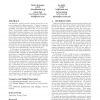Free Online Productivity Tools
i2Speak
i2Symbol
i2OCR
iTex2Img
iWeb2Print
iWeb2Shot
i2Type
iPdf2Split
iPdf2Merge
i2Bopomofo
i2Arabic
i2Style
i2Image
i2PDF
iLatex2Rtf
Sci2ools
119
click to vote
CORR
2007
Springer
2007
Springer
On Compact Routing for the Internet
The Internet’s routing system is facing stresses due to its poor fundamental scaling properties. Compact routing is a research field that studies fundamental limits of routing scalability and designs algorithms that try to meet these limits. In particular, compact routing research shows that shortest-path routing, forming a core of traditional routing algorithms, cannot guarantee routing table (RT) sizes that on all network topologies grow slower than linearly as functions of the network size. However, there are plenty of compact routing schemes that relax the shortest-path requirement and allow for improved, sublinear RT size scaling that is mathematically provable for all static network topologies. In particular, there exist compact routing schemes designed for grids, trees, and Internet-like topologies that offer RT sizes that scale logarithmically with the network size. In this paper, we demonstrate that in view of recent results in compact routing research, such logarithmic s...
Related Content
| Added | 13 Dec 2010 |
| Updated | 13 Dec 2010 |
| Type | Journal |
| Year | 2007 |
| Where | CORR |
| Authors | Dmitri V. Krioukov, Kimberly C. Claffy, Kevin R. Fall, Arthur Brady |
Comments (0)

